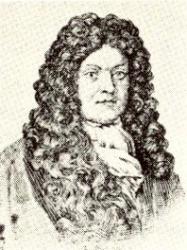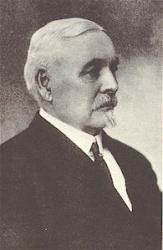Planning worship?
Check out our sister site, ZeteoSearch.org,
for 20+ additional resources related to your search.
- |
User Links
Person Results
‹ Return to hymnal








Export as CSV
Ödön Vasváry
Person Name: V. Ö. Hymnal Number: 338 Translator of "Óh áldott város Bethlehem" in Református énekes-könyv
Ödön Vasváry
Ahasuer Fritsch

1629 - 1701 Person Name: Fritsch A. Hymnal Number: 311 Composer (melody) of "[Dicséret zeng neked]" in Református énekes-könyv Born: December 16, 1629, Mücheln, Saxony.
Died: August 24, 1701, Rudolstadt, Germany.
With help from the family of a young noble he tutored, Fritsch received a good education, earning his law degree from the University of Jena in 1661. He later became chancellor of the university and president of the Consistory of Rudolstadt. He wrote on numerous subjects, including antiquities, law, and religion, and collected hymns.
Hymns--
"Liebster Immanuel, Herzog der Frommen"
"Dearest Immanuel, Prince of the Lowly"
Music--
WAS FRAG' ICH NACH DER WELT
--www.cyberhymnal.org/bio
Ahasuer Fritsch
William Hayman Cummings

1831 - 1915 Person Name: Cummings W. H. Hymnal Number: 276 Composer of "[Halld mint zeng az egész ég]" in Református énekes-könyv William H. Cummings (b. Sidbury, Devonshire, England, 1831; d. Dulwich, London, England, 1915) had a lifelong love of Felix Mendelssohn, sparked when he sang at age sixteen in the first London performance of Elijah, which was directed by Mendelssohn himself. As a young boy, Cummings had been a chorister at St. Paul's Cathedral and later sang in the choirs of the Temple Church, Westminster Abbey, and the Chapel Royal. Cummings became a famous tenor–he sang in oratorios and was especially known for his evangelist role in the Bach passions. He taught voice at the Royal Academy of Music and the Royal Normal College and School for the Blind in London and was also an accomplished organist. Cummings wrote books and articles on music history, wrote a biography of Henry Purcell and edited his music, and composed many choral pieces.
Bert Polman
William Hayman Cummings
Hans G. Nägeli

1773 - 1836 Person Name: Nägeli H. G. Hymnal Number: 316a Composer (melody) of "[Óh áldott érzület Keresztyén szeretet]" in Református énekes-könyv Johann G. Nageli (b. Wetzikon, near Zurich, Switzerland, 1773; d. Wetzikon, 1836) was an influential music educator who lectured throughout Germany and France. Influenced by Johann Pestalozzi, he published his theories of music education in Gangbildungslehre (1810), a book that made a strong impact on Lowell Mason. Nageli composed mainly" choral works, including settings of Goethe's poetry. He received his early instruction from his father, then in Zurich, where he concentrated on the music of. S. Bach. In Zurich, he also established a lending library and a publishing house, which published first editions of Beethoven’s piano sonatas and music by Bach, Handel, and Frescobaldi.
Bert Polman
Hans G. Nägeli
William Henry Monk

1823 - 1889 Person Name: Monk W. H. Hymnal Number: 286 Arranger of "[Elfáradva, megterhelve]" in Református énekes-könyv William H. Monk (b. Brompton, London, England, 1823; d. London, 1889) is best known for his music editing of Hymns Ancient and Modern (1861, 1868; 1875, and 1889 editions). He also adapted music from plainsong and added accompaniments for Introits for Use Throughout the Year, a book issued with that famous hymnal. Beginning in his teenage years, Monk held a number of musical positions. He became choirmaster at King's College in London in 1847 and was organist and choirmaster at St. Matthias, Stoke Newington, from 1852 to 1889, where he was influenced by the Oxford Movement. At St. Matthias, Monk also began daily choral services with the choir leading the congregation in music chosen according to the church year, including psalms chanted to plainsong. He composed over fifty hymn tunes and edited The Scottish Hymnal (1872 edition) and Wordsworth's Hymns for the Holy Year (1862) as well as the periodical Parish Choir (1840-1851).
Bert Polman
William Henry Monk
W. Howard Doane

1832 - 1915 Person Name: Doane W. H. Hymnal Number: 297 Composer of "[Jézus ölébe bizton hajtom fejem le én]" in Református énekes-könyv An industrialist and philanthropist, William H. Doane (b. Preston, CT, 1832; d. South Orange, NJ, 1915), was also a staunch supporter of evangelistic campaigns and a prolific writer of hymn tunes. He was head of a large woodworking machinery plant in Cincinnati and a civic leader in that city. He showed his devotion to the church by supporting the work of the evangelistic team of Dwight L. Moody and Ira D. Sankey and by endowing Moody Bible Institute in Chicago and Denison University in Granville, Ohio. An amateur composer, Doane wrote over twenty-two hundred hymn and gospel song tunes, and he edited over forty songbooks.
Bert Polman
============
Doane, William Howard, p. 304, he was born Feb. 3, 1832. His first Sunday School hymn-book was Sabbath Gems published in 1861. He has composed about 1000 tunes, songs, anthems, &c. He has written but few hymns. Of these "No one knows but Jesus," "Precious Saviour, dearest Friend," and "Saviour, like a bird to Thee," are noted in Burrage's Baptist Hymn Writers. 1888, p. 557.
--John Julian, Dictionary of Hymnology, Appendix, Part II (1907)
===================
Doane, W. H. (William Howard), born in Preston, Connecticut, 1831, and educated for the musical profession by eminent American and German masters. He has had for years the superintendence of a large Baptist Sunday School in Cincinnati, Ohio, where he resides. Although not a hymnwriter, the wonderful success which has attended his musical setting of numerous American hymns, and the number of his musical editions of hymnbooks for Sunday Schools and evangelistic purposes, bring him within the sphere of hymnological literature. Amongst his collections we have:—
(1) Silver Spray, 1868; (2) Pure Gold, 1877; (3) Royal Diadem, 1873; (4) Welcome Tidings, 1877; (5) Brightest and Best, 1875; (6) Fountain of Song; (7) Songs of Devotion, 1870; (8) Temple Anthems, &c.
His most popular melodies include "Near the Cross," "Safe in the Arms of Jesus," "Pass me Not," "More Love to Thee," "Rescue the Perishing," "Tell me the Old, Old Story," &c.
- John Julian, Dictionary of Hymnology (1907)
W. Howard Doane
John Bacchus Dykes

1823 - 1876 Person Name: Dykes J. B. Hymnal Number: 320 Composer of "[Szent vagy, szent vagy, szent vagy! Mindenható Isten!]" in Református énekes-könyv As a young child John Bacchus Dykes (b. Kingston-upon-Hull' England, 1823; d. Ticehurst, Sussex, England, 1876) took violin and piano lessons. At the age of ten he became the organist of St. John's in Hull, where his grandfather was vicar. After receiving a classics degree from St. Catherine College, Cambridge, England, he was ordained in the Church of England in 1847. In 1849 he became the precentor and choir director at Durham Cathedral, where he introduced reforms in the choir by insisting on consistent attendance, increasing rehearsals, and initiating music festivals. He served the parish of St. Oswald in Durham from 1862 until the year of his death. To the chagrin of his bishop, Dykes favored the high church practices associated with the Oxford Movement (choir robes, incense, and the like). A number of his three hundred hymn tunes are still respected as durable examples of Victorian hymnody. Most of his tunes were first published in Chope's Congregational Hymn and Tune Book (1857) and in early editions of the famous British hymnal, Hymns Ancient and Modern.
Bert Polman
John Bacchus Dykes
John H. Stockton
1813 - 1877 Person Name: Stockton J. H. Hymnal Number: 284 Composer (melody) of "[Az áldott orvos közeleg]" in Református énekes-könyv Stockton, John Hart, a Methodist minister, was born in 1813, and died in 1877. He was a member of the New Jersey Annual Conference of the Methodist Episcopal Church, and the successive pastoral charges that he filled as a member of that Conference are found in the Conference Journal. He was not only a preacher, but a musician and composer of tunes, as well as hymn writer. He published two gospel song books: Salvation Melodies, 1874, and Precious Songs, 1875.
Hymn Writers of the Church by Charles Nutter, 1911
===============
Stockton, John Hart, b. April 19, 1813, and d. March 25, 1877, was the author of "Come, every soul by sin oppressed" (Invitation), in I.D. Sankey's Sacred Songs and Solos, 1878, and of "The Cross, the Cross, the blood¬stained Cross" (Good Friday) in the same collection.
--John Julian, Dictionary of Hymnology, Appendix, Part II (1907)
===============
Stockton, John Hart. (New Hope, Pennsylvania, April 19, 1813--March 25, 1877). Born of Presbyterian parents, he was converted at a Methodist camp meeting in 1838, being received into full membership in the New Jersey Conference in 1857. Because of ill health he twice took the "supernumerary relations." He withdrew from actual pastoral work in 1874 and engaged in compiling and publishing gospel hymn books, issuing Salvation Melodies that year and Precious Songs in 1875, writing both words and music for a number of the songs. He died suddenly after attending a Sunday morning service at Arch Street Church, Philadelphia. Our Hymnody, McCutchan, has, perhaps, the fullest account of him readily available.
--Robert G. McCutchan, DNAH Archives
John H. Stockton
J. A. P. Schulz

1747 - 1800 Person Name: Schulz J. A. P. Hymnal Number: 340 Composer (melody) of "[Oh jőjjetek mind ide, kis gyerme kek]" in Református énekes-könyv Johann Abraham Peter Schulz Germany 1747-1800. Born at Luneburg, Germany, son of a baker, he attended St Michaelis school in Luneburg and studied organ, then the Johanneum from 1759-1764. In 1765 he was a student of composer, Johann Kimberger, and then taught in Berlin himself. In 1768 Kimberger recommended Schulz for the position of music teacher and accompanist to the Polish Princess Sapieha Woiwodin von Smolensk. Schulz moved to Berlin and traveled with her for three years performing throughout Europe, where he came in contact with many new musical ideas. He married Catharina Maria Gercken, and they had a daughter, Celle. He served as the conductor of the French Theatre in Berlin from 1776-1780. From 1786-1787 he was the Kapellmeister of Prince Henry in Rheinsberg. He began writing operas in 1785 and became musical director of the Berlin French theatre. Schulz went on to serve as Court Kapellmeister in Copenhagen from 1787-1795 before returning to Berlin. In Copenhagen the music library burned down, and he had a breakdown in health from trying to save it. His health suffered further from the effects of a shipwreck he experienced in 1796. Schulz wrote seven operas, stage music, oratorios, and cantatas, as well as piano pieces, folk songs, and church music. He also wrote articles on music theory for Johann Georg Sulzer’s ‘Allgemeine Theorie der schonen Kunste’ in four volumes. He died at Schwedt an der Oder, Germany.
John Perry
J. A. P. Schulz
C. C. Case

1843 - 1918 Person Name: Case C. C. Hymnal Number: 348 Composer of "[Egyetlen forrása minden kegynek]" in Református énekes-könyv Charles Clinton Case USA 1843-1918. Born in Linesville, PA, his family moved to Gustavus, OH, when he was four. His father was an accomplished violinist, but a neighbor gave him a small violin when he was nine, and he mastered it before he could read music. At age 16 he went to singing school (without parental consent), borrowing the money from a neighbor. C. A. Bentley, a prominent conductor, was his first vocal music instructor, and William Bradbury's “Jubilee” was the school textbook. For three winters in a row, he attended Bentley's singing school, working his father's farm in the summer. He married Annie Williams. In 1866 he studied music in Boston with B. F. Baker. He also studied under George Root, Horatio Palmer, Philip Bliss, George Webb, and others, hymnwriters in their own right. Soon after, Case began teaching music, and when James McGranahan moved two miles from his home, they became friends. Case wrote and edited a number of Gospel song books in his life. 6 works.
John Perry
C. C. Case


 My Starred Hymns
My Starred Hymns


